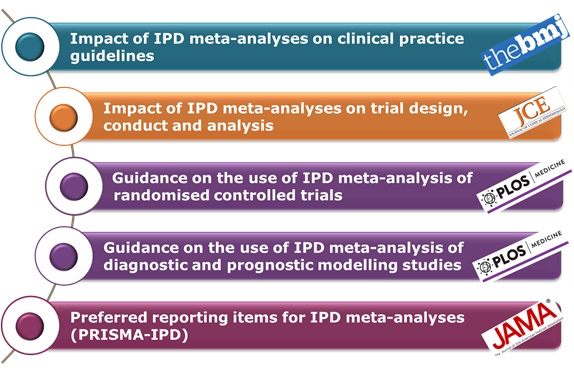
A 'state of the art' series of open-access papers on the use, impact and reporting of systematic reviews and meta-analysis based on individual participant data (IPD) have been published. In an era when greater access to trial data is likely to lead to an increase in the number of IPD meta-analyses undertaken, they provide key information for multiple stakeholders.
Many IPD meta-analyses of efficacy have changed clinical practice, but it was not clear whether this was the result of their impact on clinical practice guidelines. We show that IPD meta-analyses are under-utilised in such guidelines, but where they were used, the detailed results could help provide more nuanced recommendations. Read the paper about the uptake of systematic reviews and meta-analyses by guidelines.

By providing more detailed and reliable results, IPD meta-analyses offer greater potential than aggregate data meta-analyses to impact on trial design, conduct and analysis. We describe examples of IPD meta-analyses having a direct impact on trials, sometimes in ways that would not have been possible with aggregate data, and highlight aspects of the IPD approach that could be better exploited. Read about how individual participant data meta-analyses have influenced trial design, conduct and analysis.
Not all IPD meta-analyses are done to the same standard, and the process of collecting, checking and analysing IPD is more complex than for aggregate data. Therefore, it can be difficult for clinicians, guideline developers, funders and publishers, to understand and appraise them. Our paper provides step-by-step guidance on the use of IPD meta-analyses of randomised controlled trials, to help such stakeholders better make better use IPD meta-analyses of efficacy. Read the guidance on IPD meta-analyses of randomised control trials.
IPD meta-analysis has become increasingly popular for improving the development and validation of multi-variable prediction models. However, the issues are different to those used to assess efficacy, and the methodology is less well established. Therefore, we offer practical guidance on the use of IPD meta-analyses of diagnostic and prognostic modelling studies, outlining the key advantages and challenges. Read the guidance about IPD meta-analyses of diganostic and prognostic modeling studies.
Proper understanding, appraisal and appropriate use of IPD meta-analyses cannot be achieved without good reporting, but the Preferred Reporting Items for Systematic reviews and Meta-Analyses (PRISMA) Statement is geared to standard systematic reviews based on aggregate data. Therefore, the PRISMA-IPD statement provides a stand-alone extension to PRISMA, covering requirements that are the specific to the IPD approach. Read the PRISMA-IPD statement.
These papers stem from two collaborative projects led by MRC Clinical Trials Unit at UCL (with support from the MRC Network of Hubs for Trials Methodology Research) and the Centre for Reviews and Dissemination, York (with support from the MRC and National Institute for Health Research).
